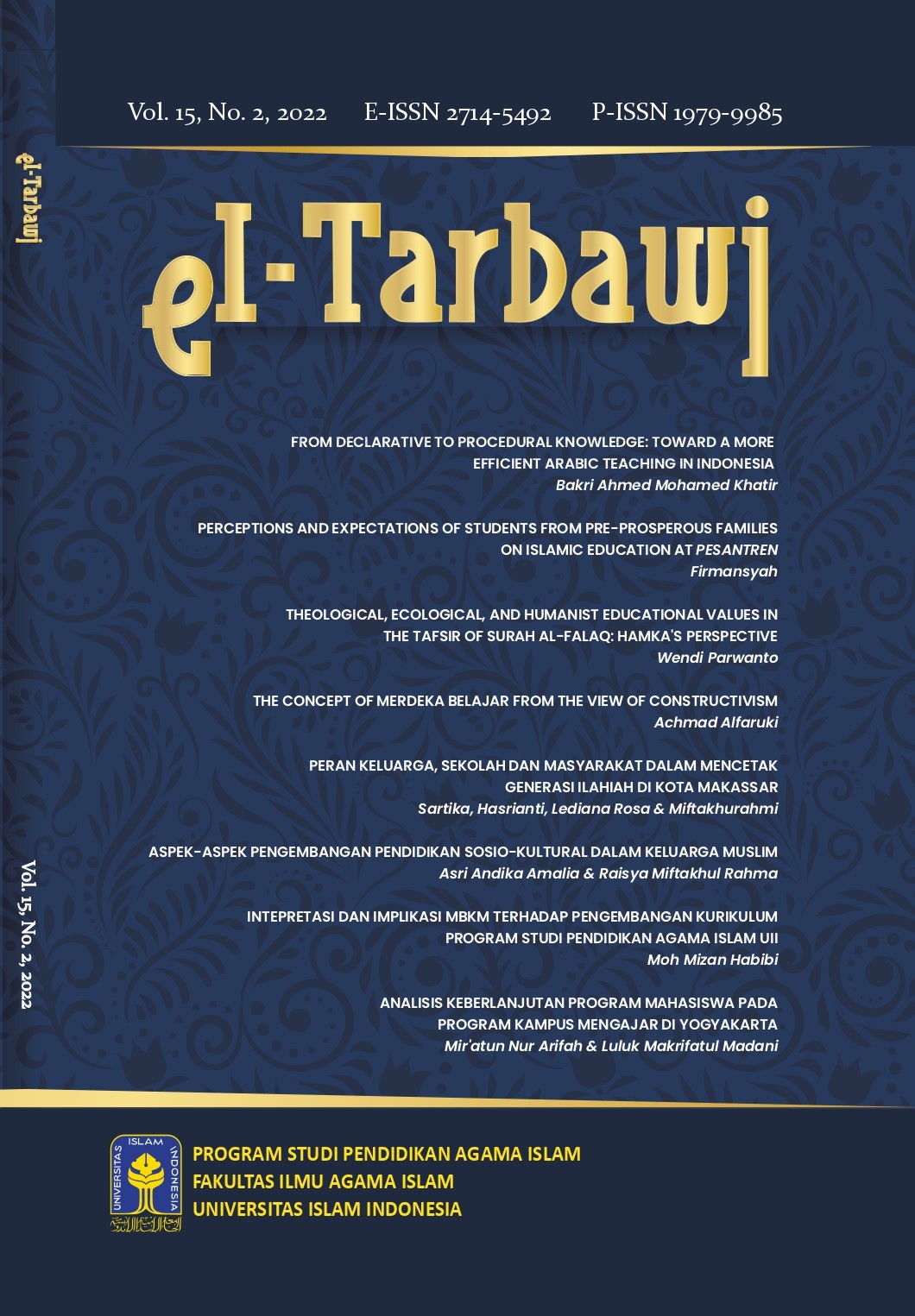Main Article Content
Abstract
Education is essential for humans in facing the complex life. In Islam, the first education starts from the family. The family is the initial environment that forms and grows individual personality through habitual instillation by parents. The purpose of this research is to discuss Islamic religious education in the family through a socio-cultural perspective. The method used by researchers is library research method by collecting literature sources from books, journals, and other related articles. This study found that the development of sociocultural education in Muslim families can be carried out through three aspects, helping each other, community unity and brotherhood of community. In constructing these socio-cultural values, parents play an important role in providing exemplary education, habits, advice, attention, rewards and punishments for children in accordance with Islamic law.
Keywords
Article Details
Copyright (c) 2023 Asri Andika Amalia, Raisya Miftakhul Rahma, Raisya Miftakhul Rahma

This work is licensed under a Creative Commons Attribution-ShareAlike 4.0 International License.
Authors retain copyright and grant the journal right of first publication with the work simultaneously licensed under a Creative Commons Attribution (CC-BY-SA) 4.0 License that allows others to share the work with an acknowledgment of the work’s authorship and initial publication in this journal.
References
- Ahyani, Hisyam, Permana, Din; Abdulloh, Agus Yosep. (2020). “Pendidikan Islam Dalam Lingkup Dimensi Sosio-Kultural Di Era Revolusi Industri.” Fitrah: Journal of Islamic Education, 1 (1), 273-288.
- Amalina, Amalina. (2020). “Pembelajaran Matematika Anak Usia Dini Di Masa Pandemi COVID-19 Tahun 2020.” Jurnal Obsesi: Jurnal Pendidikan Anak Usia Dini, 5(1), 538-548. https://doi.org/10.31004/obsesi.v5i1.592.
- An Nahlawi, Abdurrahman & Shihabbuddin. (1995). Pendidikan Islam Di Rumah, Sekolah Dan Masyarakat. Jakarta: Gema Insani Press.
- Anirah, Andi. (2007). “Pendidikan Islam Dalam Perspektif Sosio-Kultural.” Jurnal Hunafa, 4 (3), 237-248.
- Arini, Aida & Umami, Halida. (2019). “Pengembangan Pembelajaran Pendidikan Agama Islam Melalui Pembelajaran Konstruktivistik Dan Sosiokultural.” Indonesian Journal of Islamic Education Studies (IJIES), 2 (2), 104–114. https://doi.org/10.33367/ijies.v2i2.845.
- Aziz, Rosmiaty. (2019). Ilmu Pendidikan Islam. Yogyakarta: Sibuku.
- Djaelani, H Moh Solikodin. (2013). “Peran Pendidikan Agama Islam Dalam Keluarga Dan Masyarakat.” Jurnal Ilmiah WIDYA, 1 (2), 100-105.
- Hidayat, Rahmat. (2016). Ilmu Pendidikan Islam Menuntun Arah Pendidikan Islam Indonesia. Medan: Lembaga Peduli Pengembangan Pendidikan Indonesia.
- Husaini, Adian. (2010). Pendidikan Islam: Membentuk Manusia Berkarakter Dan Beradab. Cetakan 1. Jakarta: Cakrawala Publishing.
- Munawiroh. (2016). “Pendidikan Agama Islam Dalam Keluarga.” Edukasi: Jurnal Penelitian Pendidikan Agama Dan Keagamaan, 14 (3), 345-365.
- Musmualim, Musmualim, and Muhammad Miftah. (2016). “Pendidikan Islam Di Keluarga Dalam Perspektif Demokrasi (Studi Pemikiran Hasan Langgulung dan Abdurrahman an Nahlawi).” Jurnal Penelitian, 10 (2), 345-398.
- Nazir. (2003). Metode Penelitian. Jakarta: Ghalia Indonesia.
- Rohman, Miftahur. (2017). “Internalisasi Nilai-Nilai Sosio-Kultural Berbasis Etno-Religi Di Man Yogyakarta III.” Edukasia, 12 (1), 31-56.
- Rohman, Miftahur, and Hairudin Hairudin. (2018). “Konsep Tujuan Pendidikan Islam Perspektif Nilai-nilai Sosial-kultural.” Al-Tadzkiyyah: Jurnal Pendidikan Islam, 9 (1), 21-35.
- Samsudin. (2017). Sosiologi Keluarga: Studi Perubahan Fungsi Keluarga. Cetakan I. Yogyakarta: Pustaka Pelajar bekerja sama dengan IAIN Bengkulu Press.
- Surawardi. (2015). “Dasar-Dasar Sosiologis Pendidikan Islam.” Jurnal Guidance and Counseling, 1 (2), 55-68.
- Syafe’I, Imam. (2015). “Tujuan Pendidikan Islam.” Al-Tadzkiyyah Jurnal Pendidikan Islam, 6 (2), 151-166.
- Taubah, Mufatihatut. 2015. “Pendidikan Anak Dalam Keluarga Perspektif Islam.” Jurnal Pendidikan Agama Islam, 3 (1), 110–36.
- Utami, Lokita Purnamika. (2016). “Teori Konstruktivisme Dan Teori Sosiokultural: Aplikasi Dalam Pengajaranbahasa Inggris.” Jurnal Prasi, 11 (1), 4-11.
- Yusuf Perdana, Sumargono Sumargono, and Valensy Rachmedita. 2019. “Integrasi Sosiokultural Siswa Dalam Pendidikan Multikultural Melalui Pembelajaran Sejarah.” Jurnal Pendidikan Sejarah 8 (2), 79–98.
- Yuwono, Antonius. 2017. Prosiding Seminar Regional Kopri Universitas Tidar. Magelang: Universitas Tidar
References
Ahyani, Hisyam, Permana, Din; Abdulloh, Agus Yosep. (2020). “Pendidikan Islam Dalam Lingkup Dimensi Sosio-Kultural Di Era Revolusi Industri.” Fitrah: Journal of Islamic Education, 1 (1), 273-288.
Amalina, Amalina. (2020). “Pembelajaran Matematika Anak Usia Dini Di Masa Pandemi COVID-19 Tahun 2020.” Jurnal Obsesi: Jurnal Pendidikan Anak Usia Dini, 5(1), 538-548. https://doi.org/10.31004/obsesi.v5i1.592.
An Nahlawi, Abdurrahman & Shihabbuddin. (1995). Pendidikan Islam Di Rumah, Sekolah Dan Masyarakat. Jakarta: Gema Insani Press.
Anirah, Andi. (2007). “Pendidikan Islam Dalam Perspektif Sosio-Kultural.” Jurnal Hunafa, 4 (3), 237-248.
Arini, Aida & Umami, Halida. (2019). “Pengembangan Pembelajaran Pendidikan Agama Islam Melalui Pembelajaran Konstruktivistik Dan Sosiokultural.” Indonesian Journal of Islamic Education Studies (IJIES), 2 (2), 104–114. https://doi.org/10.33367/ijies.v2i2.845.
Aziz, Rosmiaty. (2019). Ilmu Pendidikan Islam. Yogyakarta: Sibuku.
Djaelani, H Moh Solikodin. (2013). “Peran Pendidikan Agama Islam Dalam Keluarga Dan Masyarakat.” Jurnal Ilmiah WIDYA, 1 (2), 100-105.
Hidayat, Rahmat. (2016). Ilmu Pendidikan Islam Menuntun Arah Pendidikan Islam Indonesia. Medan: Lembaga Peduli Pengembangan Pendidikan Indonesia.
Husaini, Adian. (2010). Pendidikan Islam: Membentuk Manusia Berkarakter Dan Beradab. Cetakan 1. Jakarta: Cakrawala Publishing.
Munawiroh. (2016). “Pendidikan Agama Islam Dalam Keluarga.” Edukasi: Jurnal Penelitian Pendidikan Agama Dan Keagamaan, 14 (3), 345-365.
Musmualim, Musmualim, and Muhammad Miftah. (2016). “Pendidikan Islam Di Keluarga Dalam Perspektif Demokrasi (Studi Pemikiran Hasan Langgulung dan Abdurrahman an Nahlawi).” Jurnal Penelitian, 10 (2), 345-398.
Nazir. (2003). Metode Penelitian. Jakarta: Ghalia Indonesia.
Rohman, Miftahur. (2017). “Internalisasi Nilai-Nilai Sosio-Kultural Berbasis Etno-Religi Di Man Yogyakarta III.” Edukasia, 12 (1), 31-56.
Rohman, Miftahur, and Hairudin Hairudin. (2018). “Konsep Tujuan Pendidikan Islam Perspektif Nilai-nilai Sosial-kultural.” Al-Tadzkiyyah: Jurnal Pendidikan Islam, 9 (1), 21-35.
Samsudin. (2017). Sosiologi Keluarga: Studi Perubahan Fungsi Keluarga. Cetakan I. Yogyakarta: Pustaka Pelajar bekerja sama dengan IAIN Bengkulu Press.
Surawardi. (2015). “Dasar-Dasar Sosiologis Pendidikan Islam.” Jurnal Guidance and Counseling, 1 (2), 55-68.
Syafe’I, Imam. (2015). “Tujuan Pendidikan Islam.” Al-Tadzkiyyah Jurnal Pendidikan Islam, 6 (2), 151-166.
Taubah, Mufatihatut. 2015. “Pendidikan Anak Dalam Keluarga Perspektif Islam.” Jurnal Pendidikan Agama Islam, 3 (1), 110–36.
Utami, Lokita Purnamika. (2016). “Teori Konstruktivisme Dan Teori Sosiokultural: Aplikasi Dalam Pengajaranbahasa Inggris.” Jurnal Prasi, 11 (1), 4-11.
Yusuf Perdana, Sumargono Sumargono, and Valensy Rachmedita. 2019. “Integrasi Sosiokultural Siswa Dalam Pendidikan Multikultural Melalui Pembelajaran Sejarah.” Jurnal Pendidikan Sejarah 8 (2), 79–98.
Yuwono, Antonius. 2017. Prosiding Seminar Regional Kopri Universitas Tidar. Magelang: Universitas Tidar
